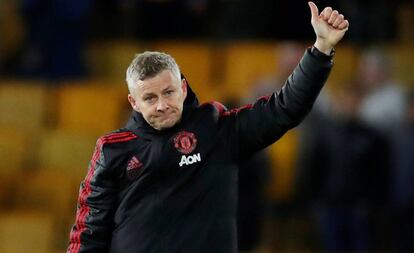The unusual rotations of Manchester United
Many were surprised by the choice of Solskjaer, but the club has opted for a person with human-management skills rather than someone who leads by imposition

Sir Alex Ferguson used to plan in advance the 11 players he would field at the next two or three upcoming matches on the calendar. He would base his choices on the rival in question, the moment in which the team found itself and the situation of each player. And then he would take it upon himself to inform each of the Manchester United players one by one of his decisions to keep us motivated ahead of our next game with the team. He always kept his word. But for me, right from the start, I found that way of keeping the dressing room connected difficult. “You will be playing within three matches,” the boss told me one day. “And if the players in my position score two hat-tricks in a row?” I would respond, with my rebellious naivety. “Well, that’s my problem. I’ll deal with that when it comes to it,” he would reply with a smile.
Solskjaer never put his ego first nor did he throw a tantrum when he didn’t play – and that despite being a pure goal scorer
Ole Gunnar Solskjaer would accept these rotations willingly, alternating without question with names of the level of Cantona, Sheringham, Cole, Yorke and Van Nistelrooy. As a soccer player he was already showing that disposition to be a club man. He never put his ego first nor did he throw a tantrum when he didn’t play – and that despite being a pure goal scorer, the hero of the European Final in 1999 with that goal in extra time that sealed the comeback against Bayern Munich, and went in just minutes after he came of the bench.
That disposition was exactly what Manchester United was looking for when it took the decision to make a change on the bench to alter the dynamic of the team. Many were surprised by the choice of Solskjaer, but the club opted for a person with human-centered management rather than someone who leads by imposition. A man with the vocation to serve above his own interests, accepting the temporary character of his job, relinquishing the spotlight to the players, giving them the freedom to unleash their talent, and also an idol in the stands who would transmit a sense of calm to the fans.
That profile of a calm and charismatic leader fits well in a club like Manchester United, a merchandising machine where the stars, which are the main assets, are the players. The manager’s shirt, after all, is not on sale in the stores. When I arrived at Manchester United in 1996, the club already seemed to me to be from another galaxy, with a global impact that these days has got even bigger thanks to the exposure – sometimes excessive – that the digital and social media era has brought with it. This new context has irredeemably changed the relationship between the manager and the dressing room, especially in the big clubs, where the management of egos has taken its place on the list of priorities.
When I arrived at Manchester United in 1996, the club already seemed to me to be from another galaxy
The squad that I found in the mid-1990s was very young, with the class of ’92 just emerging – the ideal context at the age of 21 for me to keep training as a soccer player. But adapting to the city and also the culture of the Premier League was difficult for me, especially given that the differences between Spanish and English soccer were like day or night. If Roy Keane made one of his tackles, the whole stadium would get on its feet; I, meanwhile, would jump up with joy on seeing a great dribble from Giggs. I felt completely off balance.
The line between both ways of understanding this sport has dissipated these days, but at Old Trafford we can see characteristics of those two identities when Barça meets Manchester United, whose danger lies in its physical potential, both when the ball has stopped and with quick passes, as long as they are able to close down spaces and get possession of the ball in the midfield. One thing is for sure: the 11 players that will play that game will have had their cards marked for a while now by Solskjaer, the outstanding student of Ferguson’s man management, and the person who learned how best to make the most of the boss’s rotations.
Tu suscripción se está usando en otro dispositivo
¿Quieres añadir otro usuario a tu suscripción?
Si continúas leyendo en este dispositivo, no se podrá leer en el otro.
FlechaTu suscripción se está usando en otro dispositivo y solo puedes acceder a EL PAÍS desde un dispositivo a la vez.
Si quieres compartir tu cuenta, cambia tu suscripción a la modalidad Premium, así podrás añadir otro usuario. Cada uno accederá con su propia cuenta de email, lo que os permitirá personalizar vuestra experiencia en EL PAÍS.
¿Tienes una suscripción de empresa? Accede aquí para contratar más cuentas.
En el caso de no saber quién está usando tu cuenta, te recomendamos cambiar tu contraseña aquí.
Si decides continuar compartiendo tu cuenta, este mensaje se mostrará en tu dispositivo y en el de la otra persona que está usando tu cuenta de forma indefinida, afectando a tu experiencia de lectura. Puedes consultar aquí los términos y condiciones de la suscripción digital.









































